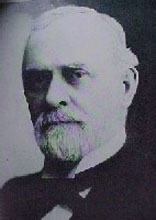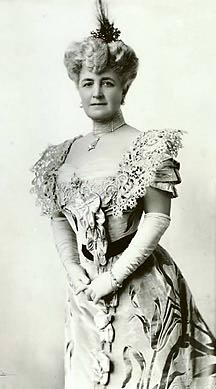
Potter Palmer

Quick Facts
Name: Potter Palmer.
Birth Date: May 20, 1826.
Death Date: May 4, 1902.
Place of Birth: Albany County, New York.
Place of Death: Chicago, Illinois (51)
Biography
Potter Palmer was born on May 20, 1826, in Albany County, New York. Palmer began his interest in retail while working as a manager in a dry-goods store in Durham, New York. While employed, Potter took careful consideration to the ethics of business. By 1848, Palmer opened his own dry-goods store in Lockport, New York . However, Palmer had his eye set on the west. In 1852, Palmer's ambition directed him to Chicago. With the small amount of money he raised from his business in Lockport, along with a small family loan, Palmer opened P. Palmer & Co. Dry Goods on Lake Street in Chicago. Soon Palmer established himself among the cities finest retailers. (52) Palmer's location on the overcrowded Lake Street would simply not hold. He began purchasing small shanties and other cheap structures along State Street in hopes of establishing himself among a more prominent retail district. In 1865, Palmer constructed his Marble Emporium and began the retail development of State Street . During the 1860s, however, Palmer would retire from retail due to health concerns and focus on real estate development. He sold his firm to two young entrepreneurs, Marshall Field and Levi Leiter. Palmer would leave Chicago due to health concerns. (53) Palmer would return to Chicago and in 1870 marry Bertha Honoré . “Palmer had been so in love with his wife, Bertha, that he had given her a luxurious hotel, the Palmer House, as a wedding present.” (54) The Palmer House was constructed on the corner of State and Monroe streets. "By the 1890s the Palmer's and their stately mansion on Lake Shore Drive would be the center of the Social and Cultural world in Chicago.” (55) Palmer was responsible for much of the real estate development of State Street, he owned about 3/4 of the street. The Palmer House was nearly completely destroyed by the Great Chicago Fire of 1871. In order to repair, Palmer borrowed $2,000,000. The Palmer house still stands on State Street not to far from Marshall Field's department store. Potter Palmer died on May 4, 1902. He left his $8,000,000 estate to his wife, Bertha. (56) |
Palmer House (ca. 1920)
Palmer Mansion (ca. 1915) |
Bertha Honoré Palmer

Quick Facts
Name: Bertha Honoré Palmer.
Birth Date: May 22, 1849.
Death Date: May 5, 1918.
Place of Birth: Louisville, Kentucky.
Place of Death: Osprey, Florida. (57)
Quote: "Even more important than the discovery of Columbus which we are gathered here to celebrate, is the fact that the general government has just discovered women." - Bertha Honoré Palmer (from her speech on opening day of the World's Columbian Exposition, May 1, 1893) (58)
Biography
Bertha Honoré was born in Louisville, Kentucky, on May 22, 1849. She was the daughter of a wealthy businessman, Henry Honoré. The family relocated to Chicago, where Bertha was privately educated. She met local businessman Potter Palmer, and the two were wed in 1871, assuring her a life of luxury. Her wedding gift was the Palmer House, and although it was destroyed in the Great Chicago Fire, she directed her efforts to help rebuild the Palmer empire. Palmer was considered the queen of Chicago high society. The Palmers move North Lake Shore Drive in 1885 established the “Gold Coast.” South-side Prairie Avenue was no longer the residence for the rich. (59) Bertha became a leader and example for women of the era. She was a great philanthropist, and donated thousands of dollars to various causes annually. Often her donations were to improve the education and economic status of women. In 1891, Palmer was appointed president of the Board of Lady Managers of the World's Columbian Exposition. She traveled overseas frequently to promote the fair. She was of considerable influence in the construction and design of the fair's Women's Building. (60) “Palmer had invited women everywhere to donate architectural ornaments for the building and in response had received a museum's worth of columns, panels, sculptured figures, window grills, doors, and other objects. Palmer believed the building could accommodate all the contributions, especially those made by prominent women.” (61) "When Bertha Palmer died in 1918, she was the largest property owner on the North Side of Chicago. Under her astute management, the real estate holdings that she inherited from her husband in 1902 had more than doubled in value. She left more than $500,000 to various charitable organizations." (62) |
World's Columbian Exposition Women's Building
Potter and Bertha Palmer's Gravesite |